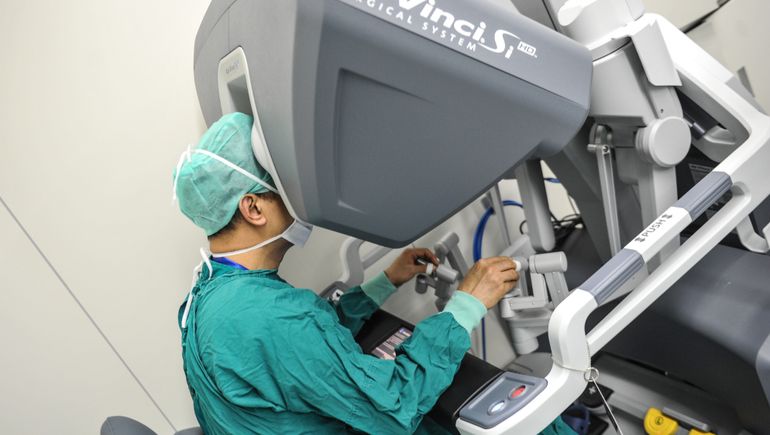By the numbers
Q3 revenue: $1.74 billion
12% increase year over year
Net income: $415.7 million
28% increase year over year
Intuitive Surgical’s third-quarter sales came in slightly below analysts’ forecasts, reflecting a higher rate of hospitals leasing robot systems and delayed projects in China due to an anti-corruption campaign in the country.
More hospital customers, especially in the U.S., turned to leasing in the quarter, which reduces revenue compared to capital equipment purchases, Intuitive CEO Gary Guthart said Thursday on the company’s earnings call.
Operating leases were 52% of third-quarter placements, compared to 37% in the same period last year, CFO Jamie Samath said. In the U.S., leasing accelerated to 70% of placements, from 48% a year ago.
“We continue to expect that the proportion of placements under operating leases will increase over time,” Samath said on the call.
Intuitive’s third-quarter revenue of $1.74 billion rose 12% from a year ago, fueled by stronger procedure growth. Wall Street analysts on average were expecting revenue of $1.77 billion, RBC Capital Markets analyst Shagun Singh wrote in a note to clients.
Worldwide procedures performed using the da Vinci robot grew by about 19%, above what several analysts were expecting.
But the Sunnyvale, California-based company said it saw an 11% decline in systems revenue due to the significant increase in the mix of lease arrangements.
“The miss relative to Street expectations came almost entirely from lower system sales (-$33M) caused by a rise in operating leases,” J.P. Morgan analyst Robbie Marcus said in a note. “While procedures were in-line, raised guidance of +21-22% (vs. +20-22% previously) leaves us bullish into year end.”
The company’s shares slipped about 3.7%, to $263.21, Friday morning on the Nasdaq.
China
In China, an important market for the robot maker, Intuitive saw lower system placements as the central government’s launch of an anti-corruption effort in healthcare slowed tender processes late in the third quarter, Guthart said. The company expects the delays to continue in the fourth quarter.
Intuitive has cautioned that local competitors also are increasingly participating in tender processes under a national quota system and pressuring prices.
Guthart added that the pressures in China are likely to persist for several quarters.
Impact of GLP-1 drugs
The robot maker, which flagged last quarter that patient interest in new GLP-1 weight-loss drugs curbed growth in bariatric procedures, said on Thursday that it was gaining market share in that surgical segment. As a result, bariatric surgeries, which represent about 4% to 5% of its total procedures, continued to post double-digit growth, Samath said.
Myriam Curet, Intuitive’s chief medical officer, said she thinks patients’ interest in the new drugs could be short-lived. “Given compliance issues, costs, side effects, we expect that many of them will not stay on the drug for longer than a year or two, and at that time will consider bariatric surgery. So I think, overall, we’ll see an increased interest in bariatric surgery, but that will get delayed in the short term.”
Outlook
Intuitive raised the low end of its full-year forecast for 2023 procedure growth to 21% from 20% and maintained the high end of the range at 22%. The low end of the range reflects continued slowing of bariatric growth rates in the U.S., macroeconomic challenges that could affect hospitals and patient spending, and uncertainty over how long demand from patients who put off procedures during the pandemic will remain elevated, according to company executives.
The high end of the range assumes macroeconomic challenges do not have a significant impact on hospital procedure volumes and bariatric growth rates continue at third-quarter levels, they said.

